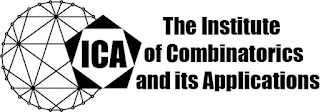Dr. Pablo Spiga awarded the 2022 Hall Medal of the ICA
For immediate release Contact:
Sarah Holliday
March 9, 2023 Secretary
of the ICA
Email: sarah.holliday@gmail.com
url: the-ica.org
Dr. Pablo
Spiga awarded the 2022 Hall Medal of the ICA
Hall Medals recognize extensive quality research with substantial
international impact by Fellows of the ICA in mid-career.
Pablo Spiga is Professor of Mathematics at the University of Milano-Bicocca, and is
one of the most innovative and productive combinatorial mathematicians of his
generation. Pablo works across permutation group theory and graph symmetry with
applications impinging on number theory, model theory, finite geometry and
semigroup theory. Since graduating with his PhD from Queen Mary University of
London in 2004, he has published an astonishing 125 journal articles with two
research monographs in the pipeline.
Pablo Spiga is well known for his work on graph
symmetry, for example, his proof of the Babai-Godsil conjecture, and the
Potocnik-Spiga-Verret (PSV) conjecture that local semiprimitivity is the
precise property to guarantee restrictions on the vertex stabiliser for
vertex-transitive graphs. Pablo’s work is breath-takingly innovative, yielding
unexpected results. For example, apart from natural exceptions, every element
of every finite primitive permutation group has at least one regular cycle.
Many of Pablo’s results were motivated from other areas: his work on
irreducible linear groups led to his astonishing result that no primitive
permutation group has as many as three subdegrees with each pair coprime. His
classification of finite primitive permutation groups containing elements with
few cycles was directly applied to bound the normal covering numbers of
symmetric groups, and his proof of Cherlin's conjecture for primitive binary
groups concerns the complexity of a relational structure in model theory.
The Institute of Combinatorics and its Applications
is an international scholarly society that was founded in 1990 by Ralph
Stanton; the ICA was established for the purpose of promoting the development
of combinatorics and of encouraging publications and conferences in
combinatorics and its applications.


Comments
Post a Comment